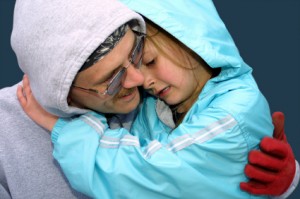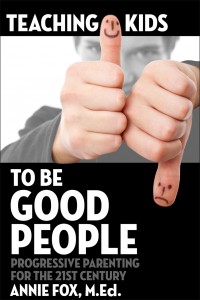|
|
February 6, 2013
 "I'm sorry, Daddy. I didn't know." When a very young child intentionally hurts another, how do we respond? With outrage and anger? Threats and intimidation? None of the above. Young children are ignorant, as in, they don’t know any better. Instead of shouting, a caring adult needs to step in and say to the child, “When you do that, you hurt others. When you hurt others you hurt yourself. The next time you feel so upset that you feel like doing harm, come to me. Let’s talk and work together. I can help you learn to handle those big feelings in safer ways, so that you can be a helper, not a hurter.”
When adults treat children in this respectful, compassionate way, children learn to be compassionate. But when adults respond to a child’s ignorance with anger…. how can they possibly learn about compassion?
When older children and adults behave cruelly it’s harder to view their actions through the “ignorance” lens, but it still applies. When we intentionally harm others, we are, in that moment, blindly ignorant of the hurt we cause. If, in that moment of harming, we had known better we would have done better. That’s why, whenever we get our buttons pushed and are about to lose it we need to calm down and wake up just enough to recognize the damage we are contemplating. And in that moment of pause, we realize that we do, indeed, know better.
All teachers are not parents, but all parents are teachers. Teaching kids to be good people includes teaching them how to manage their destructive emotions in constructive ways. When we witness cruelty between kids we need to summon compassion. Through our compassion for their ignorance we can help children become wiser.

January 23, 2013
I originally wrote a version of this article for TakePart.com where I contribute a weekly education post. Check out the rest of my articles there.
 ... because it's not helping Do you know the Yiddish verb, to kvetch? On the surface it simply means: to complain. As in, “Just get your homework done and stop kvetching already.” But actually, kvetching goes beyond complaining into the realm of eternal dissatisfaction where nothing is ever good enough and it becomes one’s mission in life to let everyone know exactly where and why things don’t measure up.
No one is a happy camper all the time. It’s not realistic to expect to be and it’s certainly not a requirement. And yet we keep on expecting it, don’t we? Especially those of us fortunate enough to live pretty well. When reality doesn’t meet our impossible standards we may not be able to keep our mouth shut. Of course, speaking up can be the first step toward positive change. It can also help build self-respect and healthier relationships. Which is why, when a teen bitterly complains to me about a friend who isn’t acting like one, I counsel the teen to go on record and tell the friend, “This isn’t OK and here’s why.”
What’s the alternative? Staying silent? That’s not likely to improve a relationship. So, yes, sometimes we need to complain.
But what do you do if your child constantly complains?
- “That’s stupid!”
- “This isn’t what I wanted!”
- “You can’t make me!”
- “That’s unfair!”
- “This sucks!”
What if your child’s negative attitude permeates everything?
I realize that finding fault may be an essential part of becoming a young adult. Unlike little kids who try to emulate their godlike parents, t(w)eens have begun the hard work of establishing their own unique identity, as different from us parents as imaginable. Teen negativity is often a display of independence, plain and simple. This may help us understand where it’s coming from, even though it doesn’t make the attitude any more fun to be around.
If your kid has gotten into the habit of grousing s/he may outgrow it. (We can always hope!) But hope isn’t an especially effective parenting strategy and a negative attitude can pollute your family life. Rather than lashing out in frustration or suffering silently, I suggest a direct intervention that will, at the very least, give your child insight into what it’s like to live with constant griping. I tackle the issue in my book Teaching Kids to Be Good People. This brief synopsis offers some tips on how to start turning around a negative attitude:
Conversation That Counts
Some complaints are helpful; some aren’t. Discuss with your child the concept of complaining. Point out that some complaints are helpful. (“The roof is leaking on my head.” “We’re out of toothpaste again.”) These can become action points. Other types of complaints aren’t intended to be helpful. They’re simply a chance to vent or to blame. (“This assignment is boring!” “Why did I get her for a sister?” “You kids never do anything right!”)
Reverse role-play. Tell your child that you’re going to “act out” one (unhelpful) complaint that you regularly hear from him/her. Be realistic in your dramatization, but not unkind. Remember you’re trying to teach, not wound. Now ask your child to act out an unhelpful complaint s/he regularly hears from you. (Yes, this lesson is a two-way street.)
How bad is the habit we’ve gotten into? Discuss the regular grumbling and whining amongst family members that aren’t meant to be helpful. What impact does it have? What might family life be different if there were less complaining?
Make a change. Challenge each family member to catch him/herself (not anyone else) in the act of complaining and try one of these responses instead:
a) Communicate directly about what needs to be done.
b) Skip the complaint and do some or all of what needs to be done (on your own).
c) Change what you can change and change your attitude about the rest.
Call another family meeting in a week to report on the progress everyone has made in creating a more cooperative atmosphere. We’re into a new year. How about working together to keep moving in a positive direction? It’s worth a try.

November 20, 2012
The following is an excerpt from my new parenting book, Teaching Kids to Be Good People. It’s from the chapter on Emotional Intelligence.
 If you try you might get what you need Right before Thanksgiving a few years back, my dear friend Bettina, who was having some health issues, emailed me: “I know this is incredibly presumptuous and Miss Manners would be scandalized, but I’m wrangling for an invitation.”
I was blown away. Not by her directness (God no!), but by her feeling that she had no right to say, “I’m not feeling well and I don’t want to be alone. Can I come over?” Immediately I called and thanked her for trusting me to understand her vulnerability. I also gave her top marks for the way she had honored herself by asking for what she needed. She was relieved to hear that she’d done the right thing by speaking up.
Most of us are much quicker to stand up for others than for ourselves. On some level we must believe we don’t deserve to get our emotional needs met. But where does that foolishness come from? Here’s my theory . . .
Babies are irresistibly cute so adults fall hard and take good care of them. Once they’ve gotten their sweet baby hooks into our hearts, they are experts at expressing their physical and emotional needs, nonverbally. As our children grow, our conversations with them center mostly on the physical aspects of life: Sweetheart, are you hungry? Do you want something to drink? Is it nap time? Why don’t you put on a sweater? As a result, asking for tangible stuff is very easy for kids: Dad, I need a ride. Mom, I need you to sign this. I need a new phone. I need money.
Because most parents don’t teach kids about expressing emotional needs, teens rarely say: I need a hug. I need to share this exciting news! I need you to listen. I need you to tell me the truth. I need help.
I asked a bunch of sixth–eighth graders to rate themselves on these two statements: “It’s easy for me to ask for help” and “I pretend things are OK when they aren’t.” The results? Twenty-five percent of the kids said it was “never or almost never” easy to ask for help. Another 25 percent reported that “sometimes” they had trouble asking for help. And here’s another sad finding: A whopping 83 percent admitted that “sometimes, always, or almost always” they pretend things are OK when they aren’t.
An unwillingness to ask for help, coupled with a habit of pretending things are fine when they’re not, is unhealthy. When we deny our human need to connect heart-to-heart, we end up short-changing ourselves and the people we’re closest to.
A parent’s role is to raise an emotionally healthy young adult. That includes helping a child recognize what s/he’s feeling and learning to ask for support when needed. Of course self-reliance is essential and being able to calm yourself at times of stress is a life skill, but there’s no denying that we all feel vulnerable at times. It’s also true that we’re all interdependent. When we let people know how we feel and allow them to love us and help us, we honor our humanity. We do the same when we love and help others.
On that Thanksgiving, my family and I were heading out of town, so our home was going to be cold and dark. I couldn’t offer Bettina a warm place at our table. But with my encouragement, she was confident enough to express her needs to another friend who gladly opened his heart and home. What would surely have been a sad and lonely day for her, turned into a wonderful occasion. Less than two years later, Bettina died. Thinking about her, then and now, I’m comforted knowing that she wasn’t alone on one of her last Thanksgiving holidays. She was brave enough to reach out and ask for what she needed. Bettina taught me a powerful lesson, especially important when we’re vulnerable: When it comes to friends and family, hold nothing back. Allow yourself to love and be loved fully, without limits.
Happy Holidays, from our family to yours.

October 4, 2012
 A very personal, practical, funny guide to challenging the culture of cruelty The gestation, labor, and heavy pushing are over! On October 3rd at 4:12 PM Teaching Kids to Be Good People was born, you can get your own Kindle version of my book right here. No Kindle? No problem! You can read the book just fine on your Mac, PC, iPod Touch, iPad, iPhone, Android, Blackberry, and Windows Phone 7 with this free Kindle Reader app. Or you can get the print edition here.
Why does anyone write a book? Serious writing can I can seriously tie your brain in knots so why go through that? I can only speak for myself. Part of it is for the glory. (I’m being honest because it’s the only way I know how to write.) When I hold one of my book and I read (great) reviews, I’m thrilled. And for that moment, I’m proud of what I’ve produced. I’m feeling that way now.
After 15 years of answering teen email, I’m convinced that many kids are missing the piece that motivates them to do the right thing. When their education primarily comes from their equally clueless peers, they’re in trouble. And so are we all. That’s why I wrote the book and why you need to read it. Our kids need us to help them develop a moral compass. And we need to do a much better job teaching them how.
Not all teachers are parents, but all parents are teachers. That’s convenient since positive character traits are teachable skills that need to be learned at home as well as at school. When we teach kids to be good people, we help the world become a safer, saner, more accepting place for all of us.
How do you define a “good person?” That’s precisely what I wanted to find out, so I crowdsourced the answer from hundreds of parents, therapists, counselors, educators and teens. Eight concepts kept reappearing in their thoughtful replies: Emotional intelligence, ethics, help, forgiveness, compassion, empathy, acceptance, and social courage—all essential, teachable skills. Teaching Kids to Be Good People will help you teach these skills to your children and/or your students. Hopefully, you will become so engaged in this process that you will inspire all the kids in your life to consciously choose to be kinder to one another.
I think of it as doing my bit for world peace. Does that work for you?
 — Older Posts »
| |















